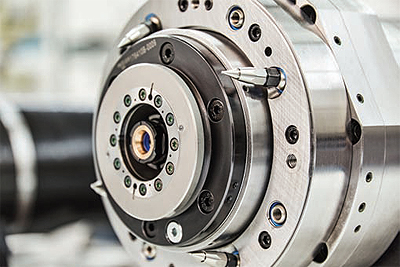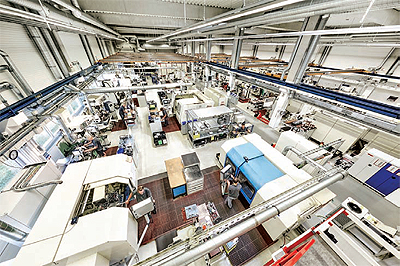Weiss Spindeltechnologie: Precision Spindle Solutions
Global spindle solutions
Operating out of its technical headquarters located in the municipality of Maroldsweisach, within Germany’s Bavaria region, Weiss Spindeltechnologie GmbH represents a market leader in the provision of high precision spindle units that are applied in turning, milling and grinding operations
Previously appearing in Manufacturing Today Europe during June 2016, Weiss Spindeltechnologie GmbH (WEISS) is a state-of-the-art manufacturing business that is geared toward the specialist manufacture of spindle units, which are typically applied across the technically demanding fields of turning, milling and grinding. “After buying the company in 1993, Mr. Weiss  established Weiss Spindeltechnologie with around 75 employees. Since that time, the business since has continued to grow, while adapting to address new technologies for motor spindles. WEISS later extended its manufacturing capacity and in 1996 introduced its first repair and service branch in the US,” elaborates Weiss Spindeltechnologie CEO, Claus-Peter Lehnert. “In 2001 the majority of the company was sold to Siemens AG, while Siemens subsequently acquired the remaining shares of the business in 2003. When Mr. Weiss sold the company it had around 180 employees and generated a turnover of around €30 million, while today WEISS is a business with 300 employees and worldwide business valued at circa €60 million in spindle manufacture and repair.”
established Weiss Spindeltechnologie with around 75 employees. Since that time, the business since has continued to grow, while adapting to address new technologies for motor spindles. WEISS later extended its manufacturing capacity and in 1996 introduced its first repair and service branch in the US,” elaborates Weiss Spindeltechnologie CEO, Claus-Peter Lehnert. “In 2001 the majority of the company was sold to Siemens AG, while Siemens subsequently acquired the remaining shares of the business in 2003. When Mr. Weiss sold the company it had around 180 employees and generated a turnover of around €30 million, while today WEISS is a business with 300 employees and worldwide business valued at circa €60 million in spindle manufacture and repair.”
WEISS is today an international venture with offices located around the world and its global network allows WEISS to provide global spindle solutions (GSS), which represent the strength and innovation of the company as well as the potential of the business to deliver leading synergies through its Siemens parent company. This allows WEISS to mobilise first-class manufacturing technologies to clients across the world, while the WEISS brand has become synonymous with the provision of high-quality spindle solutions and expert advice from development and production through to final delivery. This is further supported by a comprehensive worldwide repair and service programme.
Throughout its history WEISS has continued to invest to ensure that the business remains at the leading edge of spindle technology. This has become increasingly important, as advantages in digital technology have begun to facilitate real time data collection and smart manufacturing. “Motor spindle technology is not new technology and is a well-established product, but with the rise of smart manufacturing and ‘industry 4.0’ there is an increasing awareness that the production of spindles must incorporate intelligent components. This means that motor spindles are increasingly developed with sensors and other digital elements,” Claus explains. “We work with our parent company to create data collection and analytical tools, which are developed using both new and existing technologies. This is because ten years ago, while performance monitoring had become an important trend within the manufacturing industry, it was perhaps too early to fully implement this technology due to the power of existing computers at the time. However, with the advent of modern cloud services and computing technology, it is possible to fully integrate data collection and analysis into the manufacturing process in real-time.”
The growing integration of digital solutions across the manufacturing industry has created some exciting possibilities within the market in terms of data monitoring and collection, which can in turn be further translated into increased efficiencies in production. However, while the present phase of the digital revolution presents both equipment manufacturers and their clients within potential benefits in terms of greater efficiencies, the introduction of new technologies has also created challenges for the manufacturing sector in terms of changes in demand for more traditional components. “A majority of the research within the automotive industry for example, is currently going into the development of smart cars and it is clear that as a result of this production will change as the technology changes. This does not necessarily mean that future car designs will not need engine blocks or as many gears, but there will certainly be an increased demand for electric motors within the automotive industry,” Claus says. “This could have an impact on our business because we sell motor spindles to machine tool manufacturers and the future development of smart cars could lead to a drop in the need of milling machines and hence a reduction in the requirement of motor spindles.”
To address this on-going change in the market, WEISS is currently focused on enhancing both its productivity and profitability, though modernising its factories and developing advanced machine tool products. “We are actively developing more complex spindles that can be applied to milling machines that are capable of both milling and turning, which can be quite challenging in terms of design,” Claus details. “The benefit of machines that offer both milling and turning operations is that they have a smaller footprint on the factory floor and only require a single operator to use. This means that while the initial cost of the machine is slightly higher, the equipment will eventually pay for itself through efficiency savings.”
By continuing to invest into the introduction of digital technology, WEISS is able to maintain a leading position in motor spindle manufacture and to rise to the challenges that are created by operating within a dynamic and fast-changing manufacturing environment. This has further allowed the business to develop a strategy that will ensure that WEISS is a firmly established manufacturing brand for both today, as well as for the future. “We are very focused on delivering value stream oriented manufacturing and design processes that eliminate lost time and to increase throughput,” Claus concludes. “The industry is used to lead times of 24 weeks for spindle design, manufacture and delivery, while we have been able to reduce this by around 20 per cent to just 18 weeks. We also work to comply with the manufacturing cycles of our clients, while proving spindles for specialist machines quickly and efficiently.”
Weiss Spindeltechnologie GmbH
Products: Standard and bespoke motor spindle solutions
